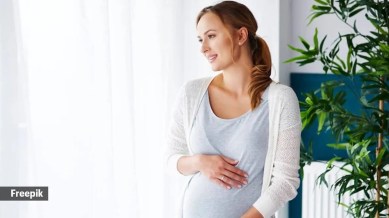📣 For more lifestyle news, click here to join our WhatsApp Channel and also follow us on Instagram
Nutritionist saw six cases of gallbladder stones in postpartum women last month: ‘Do not load up on ghee, butter and oil’
Regular medical check-ups and abdominal ultrasounds, when recommended, allow for early detection and timely treatment

Nutritionist Amita Gadre recently took to Instagram to share that postpartum women often experience gall bladder stones. “In the past month, we saw six cases of gallbladder stones in women postpartum. Did you know that postpartum women are at a higher risk of developing gallstones?”
According to her, hormonal changes during this phase slow down gallbladder emptying. “Along with that, women are often loaded with a high-fat diet, which again increases the chance of gallstones,” added Gadre.
monthly limit of free stories.
with an Express account.
Mentioning that postpartum women often prioritise weight loss and focus only on limiting sugar intake, she continued: “A lot of women also undergo rapid weight loss where the focus is only on sugar while fibre and vegetables take a backseat. That also increases the risk of gallstones.”
She listed down ways to help prevent and control gallstones
*Do not load up on ghee, butter and oil postpartum
*Don’t also indulge in too many sweets and sugary concoctions
*Eat a balanced diet and ensure there is optimal fibre
*Hydrate
*Start walking
Dt Nisha, consultant, dietary, nutrition and lactation expert, Motherhood Hospitals, Gurgaon, concurred that gallbladder stones are quite common among postpartum women, mainly due to the body’s natural hormonal and metabolic changes during and after pregnancy.
“The rise in estrogen and progesterone levels affects how the gallbladder functions, often leading to slower emptying of bile and higher cholesterol saturation, which encourages stone formation. Many new mothers tend to lose weight rapidly after delivery, which further alters bile composition and increases the risk of gallstones. Women may start noticing symptoms like pain in the upper right abdomen, nausea, vomiting, or discomfort after eating fatty foods,” said Nisha.
However, she pointed out that not all gallstones cause symptoms, and some may remain silent for years until they lead to complications such as inflammation or infection. “Postpartum women need to adopt preventive measures early. Eating a balanced diet rich in fibre, fruits, and vegetables while avoiding very high-fat meals can help. Staying hydrated and maintaining a gradual, healthy weight loss after childbirth also plays a key role,” said Nisha.
Regular medical check-ups and abdominal ultrasounds, when recommended, allow for early detection and timely treatment, preventing further complications and ensuring better recovery and comfort for new mothers.
DISCLAIMER: This article is based on information from the public domain and/or the experts we spoke to. Always consult your health practitioner before starting any routine.
📣 For more lifestyle news, click here to join our WhatsApp Channel and also follow us on Instagram